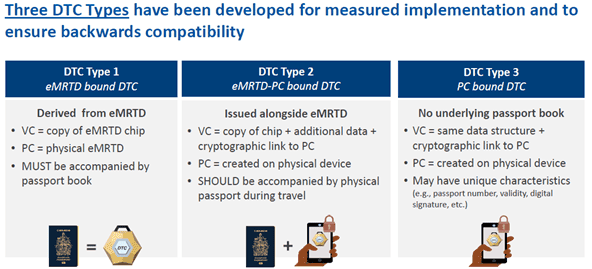The unique nature of the International Civil Aviation Organization’s (ICAO) Digital Travel Credential (DTC) presents an exceptional opportunity to build a next-generation system for passport issuance and inspection, setting a new standard for the traveler experience. Entrust fully supports the vision set out by the ICAO for technological advances from the current eMRTD standard for ePassports to a future state that will see only virtual eMRTDs. But the journey to paperless passports will take many years.
There have been several policy and technical papers released – and, despite the gaps in technical specifications, we’ve seen many seamless travel pilots already. However, much of the policy work at the ICAO level to enable the passport-issuer created DTC remains in-progress or has yet to begin. Governments and industry should begin to contribute to policy discussions now to support future technology decisions.

VC = Virtual Component PC = Physical Component
There remains significant work to do on communications protocols between the DTC and inspection systems. Most of the Type 2 and 3 specifications are yet to be developed.
DTC Pilots
Pearson Airport, Toronto
The Canada Border Services Agency worked with Entrust and Face4 Systems Inc. on smartphone-based enrollment including DTC derivation for a touchless arrivals process for returning Canadian citizens. The goal was to test passing identity information and traveler declarations to the CBSA back-end for processing, essentially replicating kiosk-based traveler processing, but via a self-service touchless process.
UK / EU
Eurostar is working with iProov and Entrust on smartphone-based enrollment including DTC derivation for a touchless train journey check-in and border processing for passengers departing the UK from St. Pancras International. The DTC can be reused for subsequent journeys. Hundreds of transactions demonstrated improved traveler throughput without compromising security. Eurostar is deploying the service as an operational system before rolling out to stations in the EU.
Netherlands / Canada
This pilot is a collaboration between the Ministry of the Interior, the Royal Netherlands Marechaussee (KMar), the National Service for Identity Data (RvIG), Schiphol Airport, KLM Royal Dutch Airlines, and IDEMIA. Funding is provided by the European Commission. Canada’s engagement is limited to facilitating temporary procedural changes to waive the presentation of a physical passport prior to boarding. The project scope is for Netherlands and Canadian citizens departing Canada for the Netherlands.
DTC Use Cases
ICAO identifies the following potential DTC use cases:
- Enable seamless travel
Using the packet of verifiable traveler data as the enabler of touchless travel experiences.
- Improve the Advance Travel Authorization process
Authentication of data submitted to Electronic Travel Authorization and similar schemes, and elimination of data errors.
- Streamline border management
Pushing the border out before travel starts by enabling the passenger to send data in advance, allowing authorities to make early watchlist checks.
- Emergency Travel Document (ETD)
Type 3 DTCs could be issued by authorities to citizens whose passport had been lost or stolen during travel, saving significant costs and inconvenience for traveler and government alike.
What can document issuers do now?
Document issuers could follow the path being paved by the Netherlands Ministry of the Interior by getting involved in seamless travel pilots. Historically, document issuers have had little influence over how their documents are utilized. A pilot of this sort would require forging close relationships with immigration authorities and airlines. A pilot under the control of a document issuer would perhaps be easier to implement. The two obvious use cases within the control of a document issuer are streamlining border management and the issuance of emergency travel documents.
The rate of adoption of innovations in the passport world has some very understandable friction. Most passports are valid for 10 years, and ICAO’s policy to be backward compatible with previous technology whenever possible may make changes appear slower in implementation. But for the people directly involved, whether from industry or government, there is a growing excitement for the changes the DTC will bring to the world of travel.
To learn more about what Entrust can offer governments and commercial travel service providers (TSPs) in an unparalleled seamless travel journey solution for their citizens and customers, read our ebook, “Providing a Seamless Citizen and Non-Citizen Border Experience,” or visit our Seamless Travel solution page.



